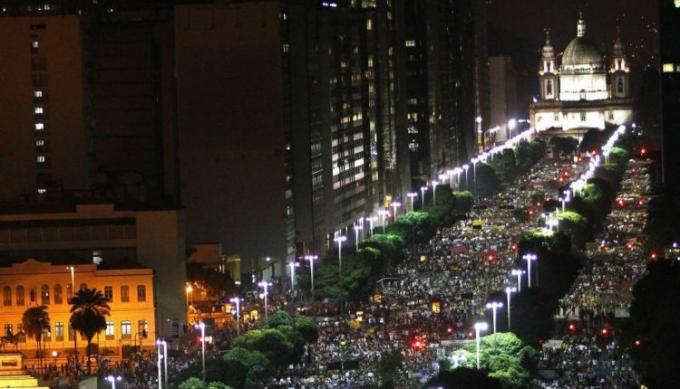To the June 2013 Conferences were popular demonstrations that took place throughout the Brazilian territory. Initially, the agenda of the protests consisted of contesting the increase in public transport fees.
Also called June demonstrations, Demonstrations of the 20 cents or June Journeys, they were among the largest mobilizations in the country.
see more
Scientists use technology to unlock secrets in ancient Egyptian art…
Archaeologists discover stunning Bronze Age tombs in…
June 2013 Conferences – Summary
Dilma Rousseff won the 2010 elections, promising to continue the projects of her predecessor government.
Among the main social programs created by the Lula government, Dilma guaranteed the permanence of Bolsa Família, Minha Casa Minha Vida and the Growth Acceleration Program (PAC).
When she assumed the post of president of Brazil, the external economic scenario was unfavorable. The United States and the European Union were experiencing a critical period of unemployment, especially among young people.
Internally, infrastructure problems prevented full growth of the national economy.
Aiming to face the external crisis and encourage the internal economy, the dilma government created a series of measures to be applied in the first half of the mandate. Among them were:
- Increased investments in infrastructure;
- Expansion and diversification of commercial partners;
- Increased exports to Mercosur and China;
- Stimulus to falls in the Selic interest rate.
Even adopting such measures, the third year of the Dilma government began with a decline in the economy due to the external crisis and the difficulty in getting projects approved in Parliament.
In 2013, Brazil hosted the Confederations Cup, an event that cost the public coffers high sums. Thus, popular dissatisfaction grew, triggering protests in Dilma Rousseff's first term.
Initially, the demonstrations had as their main agenda the increase in the passage of public transport, mainly in the capitals of the country.

Protests quickly spread across the country and turned into demonstrations with broader demands, such as:
- The end of corruption;
- The decrease in spending on the 2014 World Cup and the 2016 Olympics;
- Investment in public education;
- Investment in health.

According to some researchers, the June 2013 Journeys had some important characteristics, such as:
- Adoption of social networks for the mobilization and organization of demonstrations;
- Massive presence of young people in the protests;
- It brought together people belonging to different social classes.

In addition, they gathered thousands of people across the country.

To further weaken the image of the Dilma government, accusations of corruption were made at Petrobrás, involving several politicians from different parties and the largest contractors in Brazil.
Such denunciations led to the creation of the Operation Lava Jato, in 2014, arresting politicians and executives.
political crisis
The federal government was not the primary target of the demonstrations. The June 2013 Journeys represented popular dissatisfaction, not only with the then government, but with the corrupt tradition that plagues the country since its beginnings.
However, as it spread throughout the national territory, the identity of the movement ended up being lost with the support of politicians historically involved in cases of corruption.
These politicians would be focused on removing the democratically elected president from power to prevent, among other issues, the advances of Operation Lava Jato.
With that, the June Journeys were the starting point for the realization of the impeachment of Dilma Rousseff.
Even with her worn image, Dilma was re-elected in the 2014 presidential elections.
His second term was marked by a weak allied base in Congress, the Chamber of Deputies presided over by a declared political opponent, Eduardo Cunha (PMDB), and by an intense economic crisis.
In addition, Dilma was accused of a crime of fiscal responsibility. This accusation intensified the discontent of part of the population that, in 2015, organized several demonstrations against the president.
In the same year, the impeachment process was opened and, in 2016, Dilma Rousseff was removed from the presidency of Brazil, a position that was occupied by her vice-president, Michel Temer, until 2018.
Learn more at:
- 2008 financial crisis
- Economic crisis in Brazil (2014)

